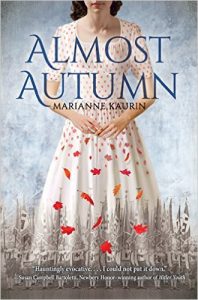 ‘Almost Autumn’ by Marianne Kaurin, and translated by Rosie Hedger, is a retelling of the Holocaust and its impact in Norway. The story, while fictional, depicts both the innocence and evil that pervaded World War II, and chronicles the hardships and losses that were all too common during that time.
‘Almost Autumn’ by Marianne Kaurin, and translated by Rosie Hedger, is a retelling of the Holocaust and its impact in Norway. The story, while fictional, depicts both the innocence and evil that pervaded World War II, and chronicles the hardships and losses that were all too common during that time.
Underlying the overarching theme of the Holocaust and how it overshadowed almost everything else at that time is the love story of a young girl, Ilse, and her next-door neighbor, Hermann. Their relationship is one of young love as they find themselves unable to stop thinking of each other, but their time together is cut short even before it truly begins when Hermann finds himself secretly working in the Resistance, trying to help Norwegian Jews leave for Sweden so they can avoid what would otherwise be an untimely fate. Though his time is being taken in this way, he and Ilse, who is Jewish herself, still share a common bond of wanting to be together and seeking out ways in which they might do so.
This part of the story – that of Ilse and Hermann – seemed as though it would be one of the main plots of the entire novel, yet it felt as though more of the story revolved around learning of Ilse’s family and their daily life and routines. The story started getting more interesting when Ilse’s father was taken by the police, not knowing when or if he would return or see his family again. One month later, when the police return for the rest of the family, the repercussions from that incident linger throughout the remainder of the story and the future of the characters who remain once the war ends.
The story often read in a very unemotional way, sometimes seeming as though it was merely telling what was happening rather than showing it. Even though this is a story of truth and courage in the face of adversity, and the fact that I know people who lived through the Holocaust themselves and have literal war stories all their own, I found myself thinking more action would have helped the story along, and more explanation of what happened to some of the characters near the end. However, it is completely possible that the author meant to leave this open-ended. Too many families were torn apart during World War II, some never knowing what came to be or if their loved ones survived. In this way, the story was most certainly true to life, and this is to be respected, as it did end up bringing about emotion even without the action.
‘Almost Autumn’ is a story that will allow you to ponder how life can change in an instant – and how, despite the atrocities that life presents, good still has a place in the world.
You can find ‘Almost Autumn’ by Marianne Kaurin, translated by Rosie Hedger here.
